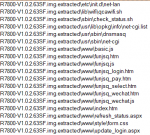Hi,
For this year I have been trying to solve a problem introduced into Voxel's software starting with .63SF.
When I reboot my R7800 it comes up in a 'bridge' like mode and starts blasting data out to the cable modem
BEFORE it tries to get a dhcp lease from the cable modem. This leaves the R7800 disconnected from the internet
until I pull the WAN wire, count to 10, and re-plug the WAN wire - at which point everything recovers and works fine.
I am not alone with this problem.
I have tried a lot of suggestions all of which have failed, I would like to solve this.
This is definitely a firmware issue: use .62SF and everything works, anything after and it's broken.
What process turns on the WAN/LAN ports?
What is the process which gets the R7800s DHCP lease from the cable modem?
Perhaps I can programmatically mimic dropping the WAN connection, though I have tried a few variants of this which all failed.
Any thoughts you might have would be appreciated.
This thread contains the previous discussions:

 www.snbforums.com
www.snbforums.com
For this year I have been trying to solve a problem introduced into Voxel's software starting with .63SF.
When I reboot my R7800 it comes up in a 'bridge' like mode and starts blasting data out to the cable modem
BEFORE it tries to get a dhcp lease from the cable modem. This leaves the R7800 disconnected from the internet
until I pull the WAN wire, count to 10, and re-plug the WAN wire - at which point everything recovers and works fine.
I am not alone with this problem.
I have tried a lot of suggestions all of which have failed, I would like to solve this.
This is definitely a firmware issue: use .62SF and everything works, anything after and it's broken.
What process turns on the WAN/LAN ports?
What is the process which gets the R7800s DHCP lease from the cable modem?
Perhaps I can programmatically mimic dropping the WAN connection, though I have tried a few variants of this which all failed.
Any thoughts you might have would be appreciated.
This thread contains the previous discussions:

Strange issue with Arris TM1602AP2 and R7800
Ever since I switched from Verizon (fiber) to Optimum (cable modem), I need to physically unplug the Ethernet connection between the cable modem and the router whenever I reboot the router to successfully connect to the Internet. I never had this issue with the Ethernet connection to the ONT...
 www.snbforums.com
www.snbforums.com


